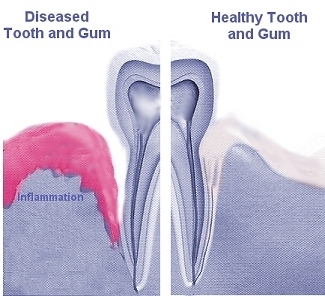Periodontal Diseases in Basking Ridge, NJ
Periodontal Diseases Are Bacterial Infections That Can Destroy The Attachment Apparatus and Bone That Surround Your Teeth. It starts when the bacteria in plaque (the sticky film that forms on teeth) release certain toxins which cause your gums to become inflamed, swollen and bleed easily. If left unchecked, gums will separate from the teeth causing pockets to form. This may cause tissue and supporting bone to be lost. If it continues to progress without treatment, it can lead to tooth loss.
How Is My Mouth Involved?
Your mouth can be a site for chronic inflammation. Early gum disease, called gingivitis, is one example of chronic low-level oral inflammation. If left untreated, gingivitis can progress to periodontitis. Some studies suggest that there may be an association between periodontitis and diseases such as heart disease, stroke, and diabetes.
What Do We Know About The Association Between Chronic Inflammation And Other Diseases?
Your oral health is even more important to helping you improve your overall health. A growing number of studies indicate that there may be an association between chronic oral inflammation, in the form of periodontitis, and diseases such as heart attack, stroke, diabetes, respiratory disease and pre- term low birthweight babies. While more research is being done, many dentists are counseling their patients to avoid chronic oral inflammation.
These Are Factors That Increase The Risk of Developing Periodontal Disease:
- Poor oral hygiene
- Smoking and tobacco use
- Diseases such as diabetes and osteoporosis
- Certain medications such as drugs used to treat heart disease, high blood pressure, and epilepsy.
- Stress
- Genetic/Hereditary factors
- Hormonal changes such as puberty, pregnancy, and menopause
- Poor nutrition
- Clenching or grinding your teeth.
In Addition, There Are Warning Signs That Can indicate a Possible Problem:
- Red, swollen, tender gums that bleed easily
- Receding gums – Gums pulling away from the teeth
- Teeth that are loose or separating
- Chronic bad breath or foul taste
- Changes in the way your teeth fit together when you bite
- Change in the fit of partial dentures
Prevention & Gum Treatment in Basking Ridge
The best way to prevent gum disease is daily brushing and flossing as well as regular check-ups and cleanings. Exercise, healthy eating, lowering cholesterol and blood pressure and quitting smoking are important steps to improving your health. However, even with the best homecare, one may still develop gum problems in which case professional treatment is necessary to arrest the disease process and prevent further progression.
Who Is A Periodontist?
Periodontics is a specialty of dentistry concerned with the diagnosis and treatment of the gums and supportive tissues surrounding the teeth. A periodontist is a dentist who specializes in the prevention, diagnosis, and treatment of periodontal disease and in the placement of dental implants. A periodontist typically has had three years of additional training in diagnosing and treating gum disease and its associated problems. Periodontists are familiar with the latest techniques for diagnosing and treating periodontal disease. Moreover, periodontists can perform cosmetic periodontal procedures to improve your smile.
Often, dentists refer patients to the periodontist when they have periodontal disease. We work closely with your dentist as a team when you are referred to our office. If any restorative work is necessary, your Dentist will provide it. Regular visits to your Dentist are an important part of periodontal maintenance. However, you are always welcome to come to our office without a referral and we also appreciate referrals from patients and friends of the practice.
